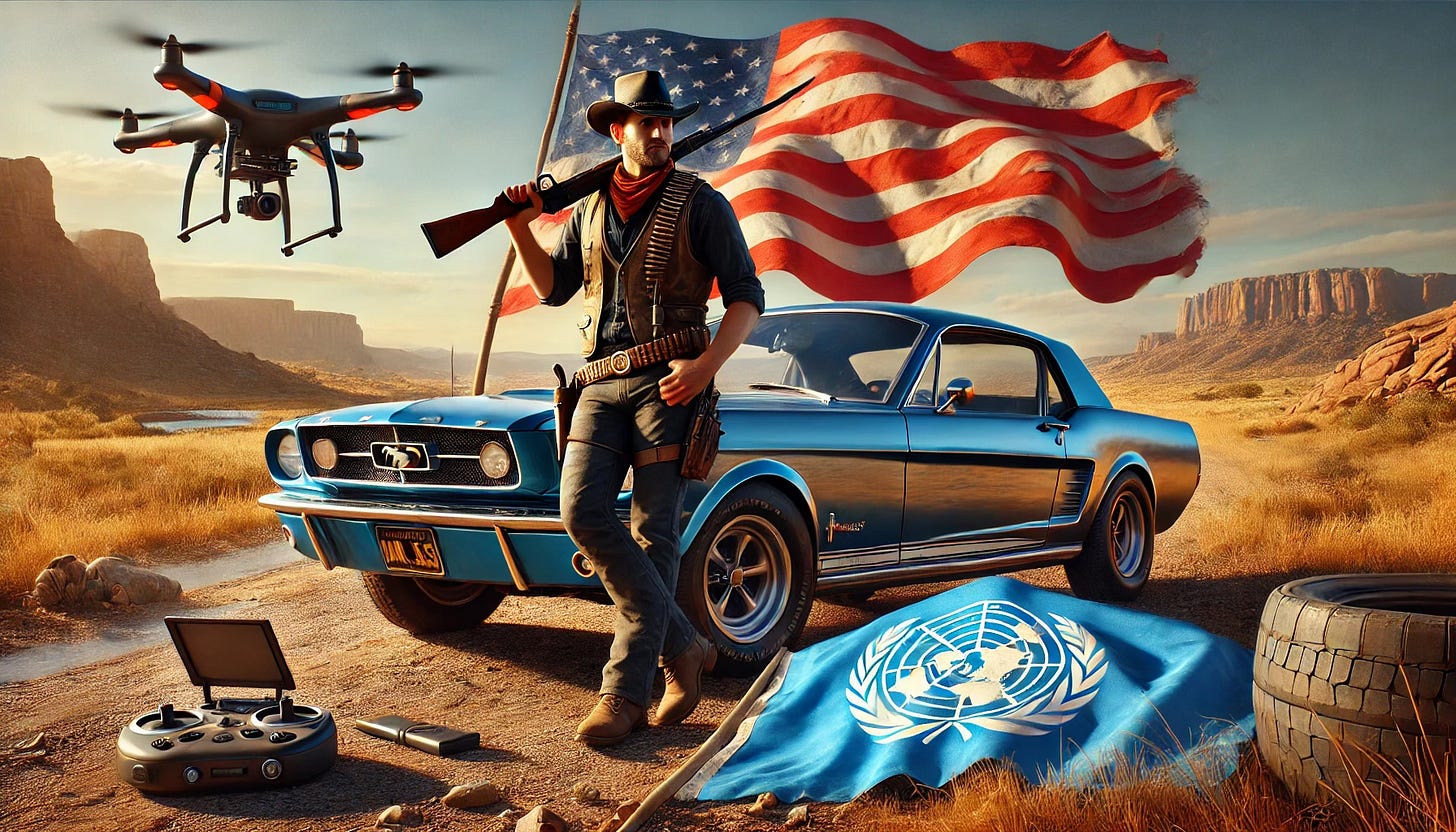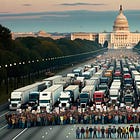Defending the Right to Own and Travel: A Modern Call for Freedom
Why Gun Owners, Drivers, and Drone Operators Should Unite Against Centralization
Written by: Andrew B. Raupp / @stemceo
Foreword: A Visit to Michigan Central Station
Upon visiting the reopening of Ford Motor Company's Michigan Central Station, a structure steeped in history and significance, one could not help but marvel at its grandeur. Yet, despite the vastness of the halls, which once echoed with the bustle of industry and innovation, there lingered a deafening absence. Thousands of square feet lay empty of the very thing this edifice ought to celebrate—the automobile. Not a single car graced the space, a glaring omission that seemed neither accidental nor inconsequential.
This absence extends beyond the station’s walls. Ford Motor Company, a titan of American ingenuity and the very embodiment of the open road, appears to be retreating from its legacy. During Detroit Lions football games, an event tied intrinsically to the Ford family, vehicles are scarcely featured. The North American International Auto Show, once the crown jewel of automotive exhibition, has diminished in stature and relevance. Such shifts beg the question: Are these isolated occurrences, or do they reflect a more orchestrated agenda?
There is mounting evidence to suggest the latter. Klaus Schwab, architect of the World Economic Forum, has presumptuously advocated for the end of personal automobile ownership, a concept dressed in the guise of sustainability and efficiency. This vision, however, is less about preservation and more about consolidation—of power, of control, of autonomy. Disturbingly, the CEOs of the Big Three automakers, the stewards of a legacy built upon individual mobility, remain silent. Their acquiescence to Schwab’s narrative is a troubling signal of where their priorities lie.
The state of Michigan, once a bastion of automotive pride, finds itself entwined in this centralizing web. Governor Gretchen Whitmer’s repeated engagements with Schwab and her administration’s alignment with the World Economic Forum’s priorities raise legitimate concerns. The echoes of these policies reverberate through the region, threatening to erode not just personal mobility but the very spirit of independence that Michigan’s industrial heritage embodies.
The absence of resistance to such shifts is disquieting. The deliberate diminishing of the automobile’s role, alongside efforts to curtail the use of drones and restrict gun ownership, paints a broader picture. These tools—vehicles, drones, firearms—represent more than utility; they are symbols of autonomy and bastions of self-reliance. The push to limit their availability undercuts the freedoms they safeguard. These trends do not arise in isolation but form part of a calculated effort to render individuals increasingly dependent upon centralized authority.
Michigan Central Station, intended to herald a new era, instead serves as a harbinger of a troubling future. The erosion of these freedoms—to move, to defend, to own—is not merely an attack on conveniences but an assault on the foundational liberties that define the human spirit. One must wonder: Are we to stand idly by as these pillars of independence are dismantled? Shall we relinquish the rights that generations before us fought to preserve, handing them over to institutions that value control above liberty?
What transpired within the walls of Michigan Central Station is emblematic of a far greater struggle. The silent halls, bereft of the automobile’s roar, are a warning—a reminder that the fight for autonomy must not be abandoned. If the tools of independence are stripped away, so too is the essence of what it means to be free. We must heed this warning, for the path ahead will be defined by those who choose to stand firm in defense of liberty or succumb to the encroaching tide of control.
Citizens Rule Book: A Palladium of Liberty (Download) #InfoWars 🇺🇸
As technological advancements reshape our world and global agendas gain traction, the concept of individual freedom—particularly regarding personal property and movement—faces significant challenges. Automobile associations, gun rights groups, and drone operators might appear to have little in common, yet their shared concerns over centralized control highlight the need for collaboration. Together, these groups can defend foundational liberties from threats posed by initiatives like "The Great Reset," championed by the World Economic Forum (WEF) and closely tied to the United Nations Sustainable Development Goals (UN SDGs) through their partnership with the UN, and related frameworks like Agenda 2030. Critics argue these changes undermine personal autonomy, shifting control over property, technology, and movement into fewer hands.
Investment firms like BlackRock, Blackstone, State Street, Morgan Stanley and Vanguard, which hold significant stakes in industries ranging from real estate to energy, are key players in these transformations. Their influence enables policies that prioritize corporate and centralized power while marginalizing individual rights. Similarly, organizations like the Club of Rome and Bilderberg Group promote technocratic solutions that often bypass democratic processes, further consolidating power among elite institutions. These trends jeopardize the fundamental freedoms that have long defined personal and economic liberty.
Such policies aren’t only abstract ideas; they are implemented through restrictions on private ownership, such as bans on gas-powered vehicles, “congestion pricing” or legislation limiting consumer access to technology. These measures, often couched in the language of "sustainability" and "progress," create a framework that erodes freedom under the guise of collective benefit. Critics argue that the true beneficiaries of these policies are the elite entities who consolidate greater economic and political power at the expense of everyday citizens.
Automobiles: A Symbol of Freedom Under Threat
For generations, automobiles have symbolized freedom and self-determination, allowing individuals to travel independently and access opportunities beyond their immediate surroundings. However, emerging sustainability initiatives—such as those supported by the WEF—aim to reduce or eliminate private vehicle ownership. Policies promoting electric-only vehicles, urban "car-free zones," and the rising costs of owning a car threaten to restrict mobility for the average citizen.
Automobile associations, historically focused on practical concerns like road safety and infrastructure, must now broaden their scope. They should advocate for the right to personal transportation as an essential liberty. Freedom of movement—enabled by affordable and accessible personal vehicles—must be protected from global mandates that prioritize centralized control over individual choice. The coordinated push to phase out gas-powered vehicles and increase regulatory barriers for private ownership represents an overt attack on individual freedom.
Beyond mobility, the cost of compliance with such initiatives has implications for wealth disparity. For example, transitioning to electric vehicles demands significant upfront investment, pricing out middle- and lower-income citizens while leaving transportation options controlled by government-regulated ridesharing platforms. These conditions risk turning personal mobility into a privilege of the elite rather than a universal right.
Drones and the Modern Right to Self-Defense
Drones, once considered niche devices for hobbyists, now serve critical roles in property monitoring, disaster response, and personal protection. Yet, growing calls for stricter regulations on drones—often under the pretense of cybersecurity and safety—risk transferring control of this technology to governments and large corporations. This leaves individuals with diminished access to tools that could enhance their security and independence.
Drone operators and enthusiasts should align with broader liberty movements to ensure their rights are safeguarded. Just as the Second Amendment protects citizens’ ability to bear arms for self-defense, similar protections could be extended to modern tools like drones. These devices represent a vital component of personal freedom in an increasingly digital and surveilled world.
Moreover, drones have transformative potential in crisis scenarios, from delivering medical supplies to locating individuals in natural disasters. Restricting access to such technology undermines its innovative potential and centralizes power over its use. When governments or corporations monopolize such tools, individuals lose both autonomy and access to critical resources that improve resilience in emergencies. Advocating for the right to own and operate drones is a natural extension of defending self-reliance and ingenuity.
The Second Amendment: A Guardrail Against Overreach
The Second Amendment has long stood as a bulwark against government overreach, emphasizing the principle that citizens have a right to self-defense and autonomy. Today, this principle applies not only to firearms but also to broader questions of property and technological rights. The fight to preserve individual ownership of vehicles, drones, and other personal assets intersects directly with the Second Amendment’s core purpose: preventing centralized authority from undermining personal liberty.
Unelected transnational bureaucrats recognize that an empowered, autonomous citizenry poses a challenge to their vision of centralized control. By defending the Second Amendment, Americans affirm their belief in decentralization and individual agency, countering efforts to consolidate power in the hands of a few.
Moreover, this advocacy must be forward-looking. As advancements in technology redefine the scope of what constitutes "arms," the principles of self-defense and autonomy enshrined in the Second Amendment should extend to contemporary tools like drones, encryption technologies, and autonomous systems. Securing these rights will ensure that the balance of power remains distributed among individuals, not concentrated in elite institutions.
Proposing a New Amendment for Modern Liberties
While existing constitutional protections offer a foundation, the complexities of the 21st century necessitate proactive measures. A new constitutional amendment could explicitly enshrine the rights to personal property and freedom of movement, ensuring they are preserved against modern threats. Such an amendment could address evolving challenges related to digital surveillance, automation, and global governance.
This proposed amendment might include:
Freedom of Movement: The unequivocal right to own and operate personal vehicles for transportation, free from undue regulatory or financial barriers.
Technological Self-Defense: The right to own and use personal drones and similar tools for protection and property management.
Protection of Personal Property: A reaffirmation that private property—whether physical or digital—cannot be confiscated, restricted, or devalued without due process.
Freedom from Surveillance Overreach: Explicit protections against invasive digital and physical monitoring without a transparent, judicially-approved warrant.
Building a Coalition for Liberty
To ensure these rights are preserved, automobile associations, gun rights advocates, and drone operators must collaborate. However, it is critical that the leadership of these organizations remains connected to the needs and voices of their constituents. History has shown that even well-intentioned leaders can be swayed or corrupted, making decisions that inadvertently accelerate centralization rather than countering it. A transparent, accountable leadership structure is essential to prevent these groups from becoming complicit in the very agendas they aim to oppose.
To ensure these rights are preserved, automobile associations, gun rights advocates, and drone operators must collaborate. By recognizing their shared interests, these groups can form a powerful coalition capable of influencing public opinion, challenging overreach, and securing legislative protections. Together, they can advocate for policies that emphasize individual rights and counterbalance the centralizing forces of globalist agendas.
Coordination is especially important because the threats to liberty increasingly stem from overlapping initiatives. Public awareness campaigns, lobbying efforts, and educational outreach should emphasize how these issues interconnect. When one aspect of personal freedom erodes—be it mobility, self-defense, or privacy—the broader framework of autonomy is at risk.
Final Thoughts
The Great Reset, Agenda 2030, the UN SDG’s and related schemes represent profound challenges to the foundational values of personal liberty and ownership. Their focus on centralized governance and diminished individual autonomy runs counter to the principles that have defined democratic societies. By uniting under a common cause, automobile associations, gun rights groups, and drone operators can ensure that the rights to movement, property, and self-defense are not only preserved but strengthened for future generations. The fight transcends specific technologies or policies—it is about safeguarding the enduring principle of liberty in an increasingly controlled and interconnected world.
Citizens Rule Book: A Palladium of Liberty (Hardcopies) 🇺🇸
A Midnight Echo: 250 Years from the Tea Party's Revolutionary Stir
Written by: Andrew B. Raupp / @stemceo





